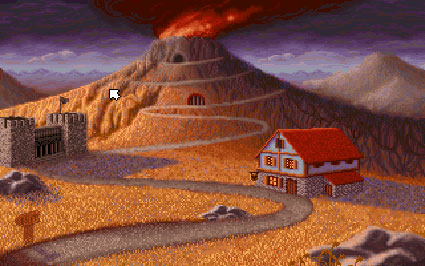We live largely in a service economy, and increasingly in the more extreme information service economy. What exactly is it we do all day? I was going to try to write an essay on this, but it became quickly apparent that would be a lot of work. Perhaps some other time. Instead, I have some random thoughts that shall let take the air.
I was at an office meeting yesterday where an upcoming presentation was being discussed. We were all asked to “bring examples of our work”. The room got very quiet. “Um, like what?” Someone eventually blurted out. I was thinking the same thing. I know all these people. I know they are all intelligent and work hard all week long. But we can’t show anyone an example of our work. It’s almost completely intangible and the effort is spread out wide over many many things, such that you can’t point to anything specific and say, “I made that.” Most of the people in the room were web page editors, along with a few event promoters and programmers, like myself. To another person of their own discipline they could perhaps, given an hour or two, explain what they did. To the man on the street, they have nothing to show.
This passage comes to mind:
A man takes up desk work in an office, becomes a father himself, but has no work to share with his son and cannot explain to the son what he’s doing.
When the office work and the “information revolution” begin to dominate, the father-son bond disintegrates. If the father inhabits the house only for an hour or two in the evenings, then women’s values, marvelous as they are, will be the only values in the house.
When the son does not actually see what his father does during the day and through all seasons of the year, a hole will appear in the son’s psyche, and the hole will fill with demons who tell him that his father’s work is evil and that the father is evil.
-Robert Bly, Iron John, p.20 (edited)
My father was a veterinarian. As an animal doctor he worked with real flesh and blood every day. He performed surgeries on dogs and cats, treated whole fields worth of pregnant cows, and occasionally shot sick horses. Following him around on his calls as a child of about eight years old, I could very plainly see the raw interaction with the world and tangible result of his work. When a horse could walk again properly or an animal gave birth, there was no question. After ten years of that, he moved to take over the family farm from my grandfather. As a farmer it was all tangible too. You work with your hands repairing the combine all day. Finally, it roars to life and you take it into the field in a flurry of dust and noise. Twenty minutes later, it returns and fills up a truck with white clean wheat – enough to easily bake bread for the entire town for a year.

His father before him did the same thing. My great-grandfather lived on the same land, though he raised chickens for laying. Thousands of them. He built 22 large chicken houses across the hillside. They were all painted red. They are all still there today.
I’ve been a full-time computer programmer for about six years now and was part-time for much longer. I know how to make the computers do just about anything I want as long as I have all my tools handy. I’ve worked up through the ranks to be the most senior developer in the company. (All the people above me are in some form of management.) But what do I actually have to show for any of it? Precious little. Every couple of years the wheel is reinvented, data is imported, and life goes on for all the people that use the data to do equally intangible tasks.
I believe that I can teach my son how to work. I can teach him to work hard and take joy in his craft. I believe I can teach him not to be lazy. But I am not sure how to teach him the connection between his labor every day and all the things around him – its connection to God and the created order, to his wife, to his children, to his neighbor, to every other little thing he does. We, as a culture, have compartmentalized these things to ridiculous levels. I’m not just trying to figure out how to teach these things to my kids, but how to understand them myself, while I am in the thick of it.
I think it’s time to shift gears.
A couple of years ago, I attended a programming conference in Portland for the (at the time) new Ruby programming language. In attendance (though I didn’t have the chance to meet him personally) was a very unusual character known only by his handle “Why the Lucky Stiff”, or just “Why” for short. Now this guy was one of the most quirky and clever programmers around. He was a prolific contributor to the open-source community and had written some brilliantly innovative web application development tools. His code was also filled with inside jokes and frequently accompanied by confusing cartoons. Actually, I never quite understood what made the guy tick, but his creative output in my field was incredible. A couple of years ago though, he abruptly dropped off the map, closed down his blog and his twitter account, and disappeared completely. Some comments he posted a few days before this happened perhaps shed light on his reasons:
“Programming is rather thankless. You see your works become replaced by superior works in a year, unable to run at all in a few more.”
He’s right. Such is the nature of this sort of technology. The farmer with draft horses slowly saw his work replaced by engines, but it took a generation or two. Programmers can see their work replaced literally in months. I tried to write an iPhone application a few weeks ago and discovered that large pieces of code from an example book published only nine months ago failed to compile anymore. Last summer, I wrote a new credit card processing website for my organization to replace one that was about five years old. I just heard in a meeting yesterday that later this fall I will be rewriting the whole thing again, with another face-lift and some slightly different technology on the back-end. “Why” makes another humorous and true comment in the same vein:
“If you program and want any longevity to your work, make a game. All else recycles, but people rewrite architectures to keep games alive.”
Too true! One of my favorite games while growing up in the early nineties was The Shadow of Yserbius, an old-school dungeon crawl that connected over the modem to a long-defunct dial-up gaming network run by the Sierra company. I treasured the 10 hours a month of long-distance calling time I was allowed to use to play it after hours. Web browsers didn’t exist at the time. Nobody had heard of the internet. You can still play this game today! Hobby programmers have torn apart the insides and reworked it to run across modern day networks on your Mac or PC using an DOS emulator and imitating the original protocol of the old dial-up servers.

Frederick Brooks, in The Mythical Man Month, writes:
“The last woe, and sometimes the last straw, [in the craft of programming], is that the product over which one has labored so long appears to be obsolete upon (or before) completion. Already the displacement of one’s thought-child is not only conceived, but scheduled.”
In other news, the 100 or so hours of time I put into the payment processing application last year are soon to be replaced. The one the last guy wrote is long forgotten. Now I got paid well for every hour of that and the money was put to good use. I am very glad I have a job. This is not a gripe about work in general (which I think is almost always a sin) but an internal conversation about the difficulties of intangible work. I could have used those 100 hours to learn to play “The Cathedral” by Augustine Barrios, then perform it for next 40 years. I could have spent 100 hours building LEGOs with my kids or reading to my wife. Perhaps I should have written a game! (I have a fun escape-from-robots-in-a-labyrinth one sketched out in my notebook.) Still, those are all fairly intangible things. Nothing near as solid as the farmer conjuring up a truckload of apples from the dirt or a carpenter building a house in what used to be an empty field.
Many philosophers and psychologists and noted that the disconnection of a man’s work with the production as a whole is unhealthy on many levels. Before perhaps, a blacksmith would create much of a machine from scratch. Now, an assembly-line worker welds the same two pieces together, all day long, all year long. This change happened during the industrial revolution. I think the humanitarian problem has been compacted in the digital age. Now, the two things we are welding together cannot even be held in our hands. Advocates of progress would say this is all fine and dandy. Production is through the roof! Just look at how cool this iPhone is! Yes, but at what cost? It is the wholeness of man, the connection to his body, family, his history, his ancestors, and the land. I think it would be beneficial for more theologians to follow this train of thought as well. The more you isolate your discipline, the more likely you are to fall into this trap.
I don’t know how many times I’ve heard the illustration of the three men digging in the field. One says he’s getting a paycheck, the second says he’s digging a hole, the third says he is building a cathedral. The goal of the illustration is to help cogs in the machine become more motivated by helping them see how wonderful the big picture is. I just heard this illustration again in fact a couple weeks ago at a human resources meeting. It’s a good one, but I think it gets repeated so often because we are continually NOT seeing how our intangible work fits into our life and culture. Mental gymnastics alone won’t heal this division.
